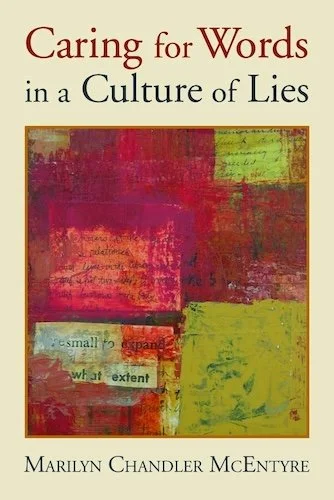Caring for Words
From “fake news” to “alternative facts,” we’re facing a crisis when it comes to the value and believability of words. I’m troubled by this on a number of levels. I’m troubled as a writer and editor who handles words for a living. I’m troubled as a reader and subscriber of various publications, running the gamut from news to opinion, right to left, “religious” to “secular,” high-brow to low. And, perhaps most of all, I’m troubled as a citizen, who is seeing confidence in the possibility of truthfulness vanishing from the public square before our very eyes.
A few years ago, on the recommendation of a friend who stewards words as well as anyone I know, I read Caring for Words in a Culture of Lies by Marilyn Chandler McEntyre, who with remarkable prescience seemed to anticipate the coming storm before most of us did. The book was timely then. It’s even more so now.
McEntyre calls upon us to think a little more deeply than our typical reflexive selves normally do. She invites us to slow down, take a deep breath, and honestly assess the ways we make sense of the world around us – and particularly the ways in which we decide what we believe to be “true” in any given area of life.
In one especially poignant passage, McEntyre posits a series of questions – not about the other, but about ourselves – that I think would serve us well at this pivotal cultural moment:
What are my responsibilities as a citizen?
As a person of faith?
As a consumer?
As a leader?
As a parent?
As an educator?
What am I avoiding knowing?
Why?
What point of view am I protecting?
Why?
How have I arrived at my assumptions about what sources of information to rely on?
What limits my angle of vision?
Have I tried to imagine how one might arrive at a different conclusion?
How much evidence do I need to be convinced?
What kind of persuasion works most effectively for me?
How do I accredit or challenge authority?
She goes on to conclude: “The answers to these questions are not simply personal. Some of them involve serious theological reflection on the relationship between the Kingdom of God and the state, what it means to give Caesar what is Caesar’s and God what is God’s, and whether and how to participate in the conduct of worldly affairs. If you’re Mennonite or Amish, that boundary is drawn pretty clearly. But most of us, I think, are navigating the murky middle ground marked out between not-so-separate church and state, trying to resist manipulation, seek truth, and act on it justly in the ways that remain open to us.”
Resisting manipulation. Seeking truth. Acting justly. These pursuits, it seems to me, are unassailable for those of us who are troubled by “post-truth” developments in any sector of society – not least for those of us who claim to follow the One who is “the way, the truth, and the life.”

